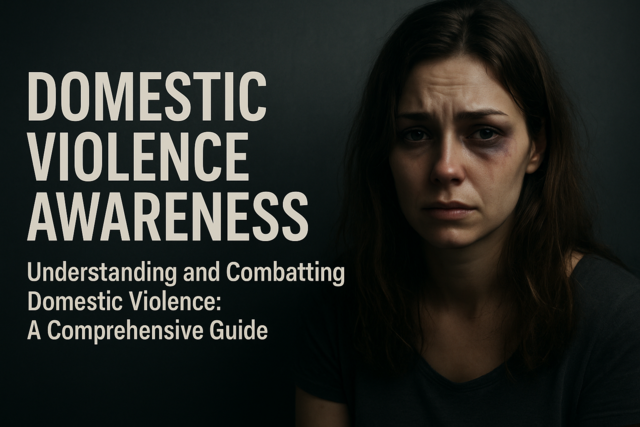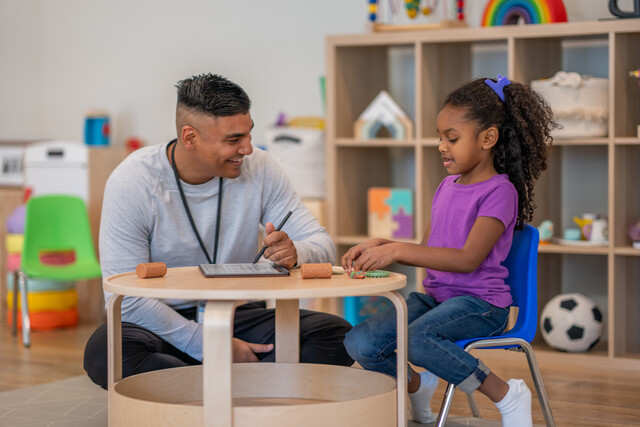Being a single parent is tough, and time for oneself is almost non-existent. Most single parents work very hard, both outside and inside the home, to ensure their children's needs are met. The parent, on the other hand, ends up exhausted at the end of each day, unable to even consider doing anything special or relaxing for themselves.
Mention "self-care," and most single parents will say, "I don't have time for that!" The thing is, you must make time. This lesson will explore why and how to practice good self-care.
The importance of self-care for the single parent
Many parents, single parents in particular, feel a need to provide some type of respite for their children, yet deny themselves even a short break during the day. Not a good idea! If you are run down, exhausted, and cranky, you will not parent effectively. If you burn yourself out, you won't be any good to your kids.
It is safe to say that we, as a species, are our own worst critics. Practicing encouraging self-talk is very important, especially for single parents who tend to be much more critical of themselves than necessary.
You truly cannot take care of anyone else unless you are on stable ground yourself. If you are too exhausted, emotionally spent, or overwrought, you will not deal with conflicts and challenges appropriately. Self-care must be done consciously. In other words, one must be dedicated to one's own all-around stress relief and health. If a single parent becomes ill from stress (it's not uncommon), they won't be fully available for the children. Single parents owe it to themselves, and their children, to practice good self-care.
The first rule of self-care
Of course there are no hard and fast rules regarding self-care, but if there were, the first rule would likely be: Forgive yourself. With so much responsibility placed on one person's shoulders, it is not surprising that many single parents feel excessive guilt over perceived shortcomings � insignificant things, such as a messy house, dishes in the sink, or laundry undone. Really, your friends do not care how spotless your house is, and if they do, you need new friends! All joking aside, unless your home is unsafe or should be featured on a reality TV show, a bit of disorganization is to be expected in a household with children. One single mother placed a wooden sign on her front door. It read, "Please excuse the mess. The children are making memories." Doesn't that put things into perspective?
Practicing supportive self-talk is very important, especially for single parents, who tend to be much more critical of themselves than necessary. This does not mean you should delude yourself with untrue positive statements; your brain knows you are fabricating. Instead, simply stop yourself from internally repeating phrases such as, "I'm such a failure," "I'm a bad parent," and "Why can't I get it together?" and replace them with positive, yet factual statements, such as, "I am doing my best," "I am managing my life as well as possible," "I know I am a caring person," "I always have my child's best interests at heart," and "This, too, shall pass." (Say only what is true for you, of course, and use personal examples for creating your own encouraging self-talk.)
Suggestions for frequent activities with long-term benefits
There are many things one can do to relieve stress. An excellent long-term solution is making and adhering to a weekly exercise, yoga, Zumba, or Tai Chi schedule. Some communities have low- or no-cost classes, or you can borrow a DVD from your local library. Even dancing to your favorite upbeat music in the living room for 10 minutes daily can lead to long-term health benefits, as well as instant stress relief.
Journaling is not only a stress reliever, it's an excellent way to record daily events and special moments we believe we'll remember, but tend to lose track of in the busyness of everyday life. Journal entries can also be quite inspiring, whether it's re-reading daily journaling over happy times, or looking back and seeing how far you've come.
Reading or re-reading motivating or inspirational literature, or choosing a fun, "lose yourself" novel is another great way to practice self-care, as is growing plants, herbs, or flowers.
Simple, inexpensive self-care ideas
Perhaps one of the best ways to relax is a full-day trip to a spa � but who has the time and finances for such an excursion, especially on a regular basis? Fortunately, there are many inexpensive or free, things you can do, most of which can be done in moments to relieve stress instantly.
Our first suggestion is a simple one � remember to breathe. When we become stressed, we restrict our breathing. The best way to combat stress or upset is simply to breathe. Take long, deep breaths to a slow count of "four." Fill your diaphragm (see diagram below), hold for four seconds, then breathe out slowly to a count of "four." Do this three or four times; the stress will lessen and your thoughts will clear. If possible, set aside time daily, even just a few minutes, for deep breathing, meditation, or visualization. It will help keep you calm, centered, and better able to deal with daily frustrations.
Taking a walk is another way a single parent can diffuse frustration and care for themselves. Not only is it instant stress relief, it's good for your health. During good weather, walking outside is energizing; when the weather is too cold or wet, many people walk "laps" around an inside shopping mall.
Sometimes, all a single parent really wants is some peace and quiet. Allow yourself to do nothing � daydream, read a magazine, or just sit quietly. Allowing your mind to wander is a great way to come up with unique solutions or ideas, or just calm down. Taking a nap is a wonderful way to recharge as well; just remember that in order for it to be truly restful, the nap should be limited to a 20- to 30-minute "power nap." The key to a restful nap, according to Michael Breus, Ph.D., is to avoid falling into deep sleep, which typically begins about 30 minutes after first falling asleep. If you have time for a longer nap, Dr. Breus recommends 90 minutes. This allows your body to enter REM (rapid eye movement) sleep. If you awaken between 30 minutes and the REM cycle, you'll actually feel even more sluggish and tired.
Taking an extra-long shower or bath is another good relaxation technique, but only if you are able to have privacy in the bathroom. Otherwise, it becomes more of a frustration than a relaxation. Turn out the lights, light some candles, lock the door, use some scented bath salts or special soaps, and relax. Even 10 or 15 minutes in a nice bath can soak away a great deal of tension, and breathing the steam will clear your nasal passages.
Maybe you can't afford a spa getaway, but you can do a "home spa" treatment with some foot scrub, clay mask for feet or face, good lotion, soothing music, and some manicure tools. This takes a bit of time, so you may need to plan your mini spa vacation for a time when the children are out of the house for several hours or overnight. You can do less-involved spa breaks, as well, or treat yourself to a manicure or pedicure at a nearby salon.
If you like to cook, find and try a fun, new recipe, or make yourself a special dessert. You can also rise a bit early in the morning for some quiet time while you linger over your coffee or tea. Or go to bed a little earlier and get some extra rest. Watching the sun rise or set is also a lovely, peaceful way to begin or end the day.
A single parent's time is limited and valuable, so single parents need to allow themselves to "just say no" to unnecessary commitments they don't have the time or desire to fulfill. Conversely, single parents should allow themselves to accept invitations for outings and activities once in a while � single parents need a night out too! Every single parent needs time out of the house without kids. It doesn't mean you don't love your children merely because you need some personal time. On the contrary, by taking time for oneself, a single parent relaxes, refreshes, and gets new perspectives, which enhances the ability to parent effectively. If possible, trade child-minding duties with another single parent, so you both have "kid-free" time; or hire a babysitter and go out with friends, shopping, or to a movie occasionally.
Surprisingly, one of the greatest stress relievers can be cleaning house. A cluttered house can make one feel claustrophobic and overwhelmed. The worst offender is surface clutter � items like unopened mail, unfiled papers, magazines, and paperwork that somehow never makes it to the trash. After a while, one stops noticing the pile of papers on the coffee table and merely moves it or pushes it aside instead of disposing of it. One of the quickest ways to make a noticeable difference in the look and feel of your home is to dispose of the surface clutter � it's really just trash no one has bothered to toss out because it's become "invisible". According to Peter Walsh in his book "It's All Too Much � an easy plan for living a richer life with less stuff," he suggests you set a timer for 30 minutes or an hour, and see how much clutter you can dispose of in that time. Cleaning house and disposing of clutter are excellent ways to work out frustrations, and you end up with a clean house, as well.
When feeling stressed, sad, or depressed, one of the best ways to lift your mood is to help someone else. Perhaps you've heard it said, "There is always someone who is worse off than you are." No matter your circumstances, there is always someone you can help. Look around your neighborhood � is there an older lady or gentleman who would benefit by your offer to pick up needed items at the store for them? That can be done while attending to your own shopping, and your mood will lift from helping someone else. Does someone you know need a ride to church, or are you able to assist with a meal program for the elderly or poor? Sometimes, eye contact, a smile, and a sincere "Hello" can do wonders for someone, and it's simple to do. Doing things for others takes you out of your own head and your own problems -- even if briefly. The effects of doing a good deed last long after the deed is done, and it gives your children a good example of kindness and generosity.
Dating and the single parent
Dating as a single parent is, to put it mildly, touchy. How much should you date, if at all? How much should you tell your child about the people you date? When should you introduce your dating partner to the children?
As far as whether to date or not, it really depends on a number of factors. Typically, right after a divorce, breakup, or birth or adoption of a child, as an unmarried parent, most individuals have neither the time nor desire for dating. In a way, this is good. It's likely the new single parent needs time to adjust to the changing circumstances. One shouldn't be cut off from everyone, however - an afternoon or night out with one, two, or a group of friends is a great way to relax and socialize, without the pressure of dating. If loneliness is your reason for dating, it may be better to seek out friends instead of romance, if you're still feeling vulnerable from the recent life changes.
Dating for fun is perfectly fine, but it is advisable to keep details from the children, particularly if you date a variety of individuals casually and/or your children are very young. Don't lie to them, of course, but as mentioned previously, the explanation and amount of information should be age-appropriate. For example, if a single parent is dating casually and their 4-year-old asks if you "like" the person, it is perfectly acceptable to say, "Yes, he/she is a friend, and we have fun together." If asked, "Do you love him/her as much as" (the child's other parent?), it's likely "no" is a truthful (and sufficient) answer. If the child asks more questions, answer them honestly, but don't "over-explain." If, on the other hand, your child is older, or you've been a single parent for some time, the conversation will likely be more detailed.
Perhaps the most difficult dating dilemma a single parent faces is, when and how to introduce your partner to your children (or vice versa). First, when should face-to-face introductions be made? This, too, depends a great deal on age. If introduced too soon and the relationship ends, the children may become confused or upset when the individual suddenly departs from their lives. This is particularly true with young children. If, on the other hand, a single parent waits too long to make the introductions, the parent might discover that the person they've fallen in love with isn't good with children. If your children are teenagers, you may wish to share more of the dating experience with them to help them with their own dilemmas (and sometimes, kids give pretty darn good advice!).
The initial meeting should be more of a casual or "play" date with everyone, not a romantic or formal meeting. Going out to eat at a child-friendly restaurant, meeting at the park, going to a mall, attending a sports event or fair, going out for ice cream, or going to a movie are all great ways to introduce your partner to your children. Your partner should participate in several "family dates" (including dates where your partner comes to your home) prior to any "sleepover" dates. If you haven't already, you should definitely introduce your children immediately if, or when, your relationship plans become serious, such as discussions about moving in together or getting married. Again, you want to make certain your new partner is good with your children, and the children feel safe and comfortable with this new person in your life. A single parent is a parent first, so if the new partner isn't good with kids, they need to go. Some single parents suggest waiting nine to 12 months prior to introducing the partner and the children, but remember, it's really important to know if everyone gets along, before the wedding hall is rented and the dress purchased!
Above all, remember to trust your instincts. As a parent, you often can sense when someone or something is a danger to your child. If you feel uncomfortable with interactions between your new partner and your children, or if the children express fear or discomfort, or report any inappropriate behavior regarding the new partner, terminate the relationship immediately.
Talking to your children about difficult subjects
Aside from dating, life is full of subjects difficult to discuss with children. Let's go over some of these subjects and possible approaches.
As mentioned frequently in this course, all discussions and information should be age-appropriate. You do not want to frighten your children, or overburden them with too much detailed information.
Also frequently mentioned is the importance of not badmouthing the non-custodial parent. Again, a single parent must remember the non-custodial parent is still the child's parent, and calling the non-custodial parent names, berating them to your children, openly fighting with them in front of the kids, or cursing at them harms not only your child, but your relationship with your child. Often, a badmouthing parent will inadvertently begin using the children as pawns to "get back" at their ex-partner. This is extremely damaging to children, particularly young children, who most likely already feel responsible for family discord. Separated parents need to treat the business of parenting the children as just that � a business. Remove emotion from the equation. Difficult, indeed, but well worth it, and much less stressful for everyone overall.
Especially immediately following the breakup, children may express concern about the new arrangements, or about their new life as a child of a single parent. It is important to reassure children that, despite the absence, the other parent still loves them (even if you doubt the truth of the statement) and that the new living situation is not due to any fault of theirs.
The main things to remember are: Be honest; make the discussion and amount of information age-appropriate; refrain from badmouthing the non-custodial parent; and always have the children's welfare as your top priority.
Other difficult subjects
Sometimes, a parent may choose to deny the child's relationship with the other parent. There are some good reasons for this, such as incarceration of the other parent prior to, or shortly after, the child's birth -- or excessive parental drug/alcohol use. This is understandable, but again, be careful about badmouthing the absent parent. As in the example of Bruce and Linda given in previous lessons, choose words carefully when discussing poor non-custodial parental behavior. The same can be said when discussing inconsistent non-custodial parents, parents who disappear and reappear from their children's lives, and parents or grandparents who have been prohibited from seeing the child to protect the child's welfare or best interests.
If the other parent remarries or begins a live-in relationship, you may wish to meet with your former spouse and their new partner privately to discuss the new arrangements. If you are remarrying, be open to allowing your former spouse and new partner to meet. At some point, they will cross paths, so it's best to do this early and on neutral ground. Make sure your children know that even though the non-custodial parent has a new partner, the fact that they, the children, are loved, will not change.
Discussing the death of a parent with your child is a very individual matter; how you explain death and the afterlife depends on your personal beliefs. It is advisable to seek help from clergy or a professional or counselor, if needed, and discuss the grieving process with your children in terms they can understand. Also, allow them to see evidence of your mourning; if you appear too stoic and unaffected, it may be misinterpreted as not caring. But don't overdo it! Again, you don't wish to frighten them. Children need to know that grieving after the death of a loved one is natural and can be experienced and survived.
Keeping it real for both of you
A single family works best if they work as a team. "Team" assignments should be age-appropriate (there's that term again!), and sincere praise should be given for a job well done, no matter how small. For a toddler, the assignment can be to put all their toys away before bedtime each day. Some ideas for praise for compliance without argument are, "I am so proud of you!" "You really help Mommy/Daddy out when you do that," or "You are such a good helper!" While a weekly or monthly allowance for performing specified chores is a good way to build responsible behavior, providing rewards for compliance with normal rules or requests is ill-advised. You can end up with a child who blackmails you for gifts and treats with bad behavior! (It happens!)
A good way to build Team Single Parent Family is to have regular family meetings. Family meetings should be conducted by the parent, with all members present. Sample family meeting rules are as follows: Each child has one vote; the parent has two votes as well as veto power or "tiebreaker power." (The "weight" of each vote may differ, due to ages of the children, but every family member's opinions and ideas should be heard and considered without derision.) Each family member gets a turn to speak without interruption. Require a raising of hands or use a "talking stick" or other symbolic object to keep the focus on whose turn it is to speak. Votes can be taken either by a show of hands, or in secret, by having family members write their choice down, fold the paper, and give it to the parent to read. Family meetings can be as formal or informal as your situation requires, but the parent should always maintain control of the meeting.
Don't be afraid to ask your child's opinion or advice. In fact, learn from your child whenever you can. Even very young children can say surprisingly wise things. Since their views of the world are pure and unspoiled, they may just suggest something fantastic that no adult would ever have dreamed of. Life is � or always should be � a learning experience, and wisdom can be found in some amazing places, even "out of the mouths of babes" � your children.
Remember, this is not an exhaustive list; each family and situation is different, so don't feel limited to what you learn here. Use these ideas as tools and building blocks for your own single parent family success story.

























